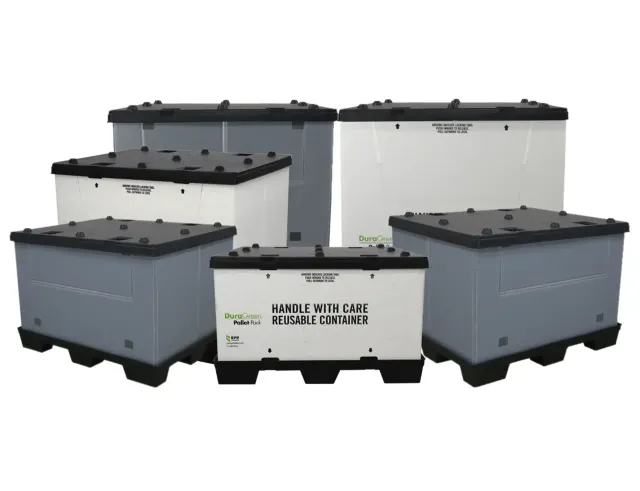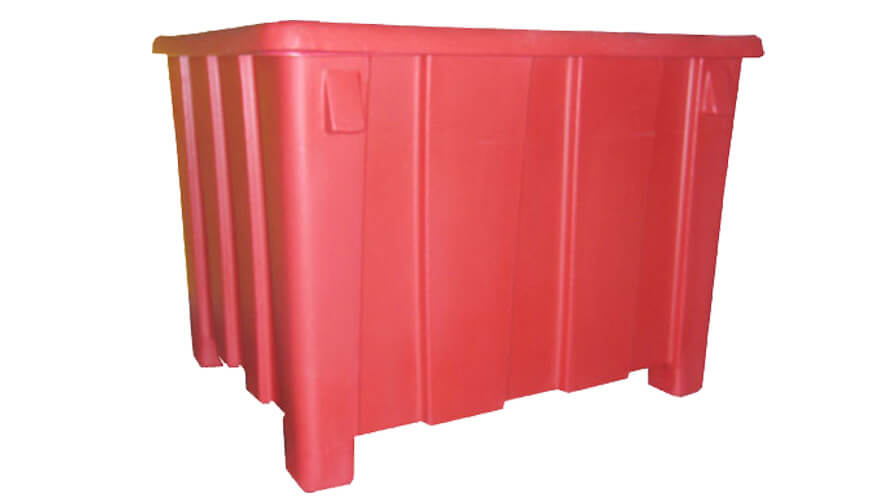The Function of Bulk Plastic Containers in Effective Recycling Practices and Sustainability
Mass plastic containers are important to modern reusing efforts. Their layout improves the effectiveness of product collection and transportation, contributing to sustainability goals. These containers not only enhance room but likewise assist in keeping track of contamination degrees. Nevertheless, their application is not without obstacles. Understanding the complete range of their effect discloses an intricate partnership in between logistics and environmental duty that calls for further exploration.
Recognizing Bulk Plastic Containers
Mass plastic containers function as an essential part in numerous industries, helping with the storage space and transport of products. These containers are generally made from durable products such as high-density polyethylene (HDPE) or polypropylene, which provide resilience and resistance to environmental factors. Their style usually includes functions like stackability and modularity, permitting efficient use of room throughout both storage space and transit.
Industries such as farming, food processing, and making often use mass plastic containers as a result of their lightweight nature and ease of handling. The containers come in different sizes and configurations, satisfying the details demands of different products. Their versatility expands beyond mere capability; they can additionally be personalized with covers, deals with, and identifying alternatives to boost functionality - Bulk Plastic Containers. Consequently, bulk plastic containers play a vital role in optimizing logistics and supply chain operations throughout several markets, therefore contributing to overall efficiency and cost-effectiveness
Benefits of Utilizing Bulk Plastic Containers in Recycling
The application of mass plastic containers considerably boosts the effectiveness of the process when companies prioritize reusing efforts. These containers are designed to optimize room, enabling for the storage space and transport of larger quantities of recyclable products. This causes fewer trips to reusing facilities, consequently decreasing fuel intake and linked exhausts.
Furthermore, bulk plastic containers are sturdy and immune to various ecological variables, ensuring that products remain secured throughout handling and transit. Their lightweight design additionally adds to decrease transportation expenses.
Furthermore, the uniformity of these containers facilitates better sorting and handling of recyclable materials, which can enhance overall recycling prices - Bulk Plastic Containers. Organizations that adopt bulk plastic containers additionally show a commitment to sustainability, positively influencing their brand name photo. Ultimately, these advantages not just enhance recycling methods however likewise add to more comprehensive ecological goals
Just How Mass Plastic Containers Facilitate Product Collection
Reliable product collection is greatly boosted by the use mass plastic containers, as they give a reliable and structured solution for collecting recyclable products. These containers are made to accommodate large quantities of materials, which simplifies the sorting and storage procedure. Their stackable layout optimizes space usage, making it simpler for centers to arrange recyclables without mess.
In addition, mass plastic containers are weather-resistant and resilient, enabling outdoor placement without destruction. This strength guarantees that products continue to be safeguarded up until they are collected for processing.

The harmony in size and shape of these containers assists in standardization across collection factors, making it possible for better monitoring of recyclable quantities. Their clear nature enables for easy visibility of materials, aiding in the tracking of contamination degrees and guaranteeing that just ideal products are collected. Overall, mass plastic containers play a crucial role in improving the material collection procedure, therefore promoting reliable reusing practices.
Transportation Effectiveness and Environmental Influence
Transport efficiency plays a vital duty in the reusing process, particularly through the optimization of tons capability wholesale plastic containers. By making the most of the volume of product transported, companies can greatly reduce the number of journeys required, thereby minimizing their carbon impact. This strategy not just enhances operational effectiveness yet likewise adds to more lasting environmental techniques.

Enhancing Load Capability
Maximizing load capacity is frequently forgotten, it plays a vital role in improving transportation effectiveness and lessening ecological effect in recycling techniques. By optimizing the volume that mass plastic containers can hold, reusing operations can decrease the variety of trips needed for transportation. This not just reduces gas usage however likewise reduces the deterioration on automobiles. Effective tons monitoring allows centers to use space efficiently, making sure that each transport cycle is as efficient as feasible. Additionally, well-optimized lots can bring about much better settlements with logistics carriers, potentially lowering total expenses. Ultimately, enhancing tons capacity adds to an extra lasting reusing system by cultivating reliable source use and decreasing waste generated throughout transport.
Lowering Carbon Footprint
As recycling operations endeavor to minimize their ecological impact, lowering the carbon footprint related to transportation becomes an essential objective. Mass plastic containers play an essential function in attaining this aim by enhancing load efficiency and enhancing logistics. Their lightweight yet sturdy layout allows for optimum cargo room application, decreasing the variety of trips required to carry materials. By settling shipments, recycling facilities can lower gas intake and greenhouse gas exhausts. In addition, purposefully locating recycling facilities minimizes transportation ranges, furthermore decreasing carbon outcomes. Employing fuel-efficient vehicles and different power sources boosts general sustainability. By incorporating these methods, the reusing industry can index considerably lessen its carbon impact, adding to an extra sustainable future.
Challenges in the Usage of Bulk Plastic Containers

Contamination Issues
Contamination concerns stand for a significant challenge in the efficient usage of mass plastic containers within reusing practices. These containers often build up deposits from previous components, resulting in blended materials that can impede the reusing procedure. Contaminants such as food waste, chemicals, or non-recyclable products can compromise the stability of the whole set, resulting in enhanced disposal prices and lowered recycling prices. Additionally, incorrect cleaning or sorting can exacerbate these concerns, making it this link hard for recycling centers to refine products effectively. The visibility of pollutants not only impacts the quality of recycled items yet likewise weakens the overall sustainability initiatives focused on lowering plastic waste. Dealing with these contamination challenges is critical for enhancing the efficacy of mass plastic container recycling.
Recycling Infrastructure Limitations
Ineffectiveness in recycling framework positions considerable obstacles for the reliable management of mass plastic containers. Several reusing centers do not have the capacity to refine big volumes of these containers successfully, causing enhanced prices and delays. Inadequate arranging modern technologies frequently lead to contamination, as bulk containers might be blended with other materials, complicating the recycling process. Limited transportation options additionally hinder the movement of bulk plastic containers to appropriate recycling facilities, resulting in boosted garbage dump waste. Furthermore, a lack of standardized protocols for mass container recycling develops confusion amongst services and customers, additionally making complex initiatives to promote sustainability. Addressing these infrastructure limitations is crucial to improve recycling methods and take full advantage of the capacity of bulk plastic containers in a circular economic climate.
Ideal Practices for Applying Bulk Plastic Containers
When companies think about applying bulk plastic containers in their reusing techniques, they ought to focus on a calculated strategy that improves performance and minimizes contamination risks. First, choosing the ideal container dimension and kind is necessary to fit the quantity of materials being processed. Organizations must additionally develop clear labeling and signage to guide individuals on correct disposal techniques, lessening complication and errors. Normal training sessions for staff can additionally strengthen these techniques, Source making sure every person understands their duties in keeping recycling stability.
In addition, companies should apply a routine upkeep routine to check and clean containers, stopping the accumulation of pollutants. Partnering with local recycling facilities can also streamline the collection process, ensuring that materials are effectively processed. Lastly, organizations ought to check and examine their recycling metrics, using this information to fine-tune methods over time and promote constant enhancement in their sustainability efforts.
The Future of Bulk Plastic Containers in Lasting Practices
As companies significantly focus on sustainability, the duty of mass plastic containers in recycling methods is set to evolve considerably. Developments in products science are causing the advancement of naturally degradable and recyclable options, improving the environmental advantages of mass plastic containers. On top of that, the execution of closed-loop systems will certainly allow for simpler collection and repurposing of these containers, reducing waste and resource intake.
Technological innovations, such as wise radar, will make it possible for business to keep an eye on the lifecycle of bulk containers, boosting performance in recycling processes. As consumer demand for lasting practices expands, businesses will likely take on mass plastic containers created for reuse and lasting worth. Additionally, partnership in between federal governments and sectors will foster the facility of standardized reusing methods, guaranteeing that mass containers are efficiently integrated into wider sustainability initiatives. Generally, the future of mass plastic containers shows up encouraging, with substantial capacity for adding to a round economic situation.
Regularly Asked Inquiries
How Are Bulk Plastic Containers Made and What Products Are Utilized?
Mass plastic containers are usually made from high-density polyethylene (HDPE) or polypropylene (PP) These products are processed through injection molding or blow molding techniques, resulting in durable, lightweight containers ideal for numerous storage and transport needs.
Can Mass Plastic Containers Be Recycled Several Times Prior To Recycling?
Yes, bulk plastic containers can be recycled numerous times before reusing. Their resilience and design allow for duplicated usage in numerous applications, advertising sustainability and source effectiveness while minimizing the requirement for brand-new containers.

What Qualifications Exist for Bulk Plastic Containers in Recycling?
Numerous accreditations for mass plastic containers consist of the Recycling Partnership's qualification, the Cradle to Cradle Licensed ™ criterion, and the Lasting Packaging Coalition's guidelines, guaranteeing containers satisfy certain environmental and recyclability standards for efficient recycling.
How Do Mass Plastic Containers Contrast to Other Recycling Storage Space Options?
Mass plastic containers use greater sturdiness and capacity contrasted to various other recycling storage space alternatives, reducing the danger of contamination and promoting efficient transport. Their layout supports much better company, boosting general effectiveness in reusing operations.
What Is the Life-span of a Mass Plastic Container in Recycling Processes?
The life-span of a bulk plastic container in reusing processes usually varies from 5 to ten years, depending on use, worldly high quality, and environmental problems, permitting for multiple cycles of use prior to ultimate disposal or recycling.
When companies focus on recycling efforts, the usage of bulk plastic containers considerably boosts the efficiency of the process. Transport efficiency plays a crucial function in the reusing procedure, specifically with the optimization of lots capability in mass plastic containers. The use of bulk plastic containers in reusing techniques encounters considerable difficulties, especially worrying contamination problems and limitations within recycling facilities. Contamination issues represent a significant obstacle in the efficient usage of bulk plastic containers within recycling practices. When companies consider carrying out mass plastic containers in their reusing methods, they ought to prioritize a calculated method that improves effectiveness and lowers contamination threats.